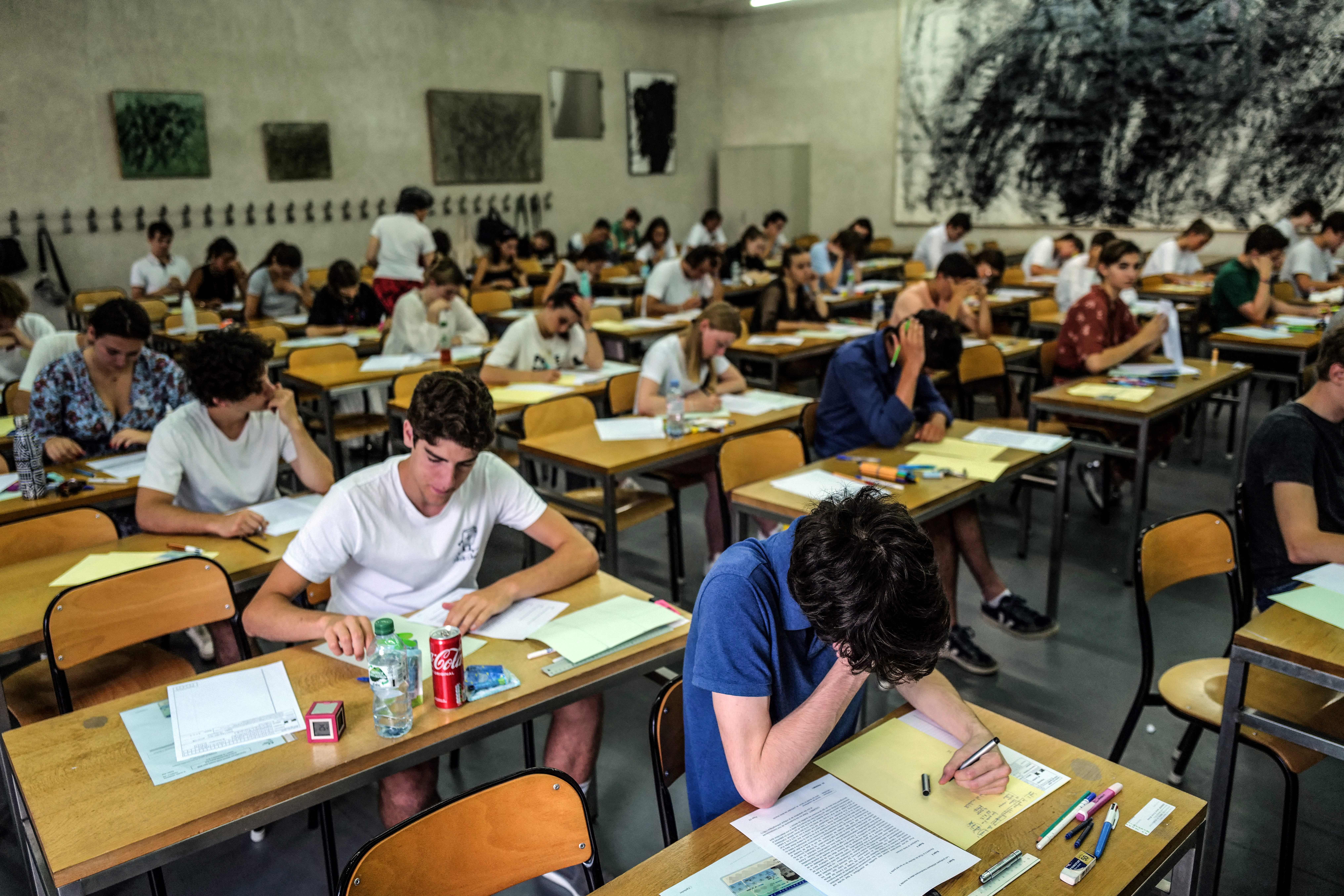From tears to Tariff points, here's a parent's guide to what to expect on A-level results day
Head reeling from all the information and emotion? Take five and read out expert tips


Parenting advice, hot topics, best buys and family finance tips delivered straight to your inbox.
You are now subscribed
Your newsletter sign-up was successful
Teens are under a lot of pressure to obtain good A-level results and get onto the best university course possible. So to help you navigate the big day, here’s what to expect on.
A-level results day is finally here. But it isn't just a big day for teens who sat the exams. It will feel like a big day for you too after all the moral support - and revision snacks - you’ve lovingly supplied. From helping teens cope with exam disappointment and making the most of places teens can get free treats to celebrate to getting your head around Clearing and considering A-level re-takes, there is a lot to consider on results day. And despite our best intentions, it’s not easy to know how to do or say the right thing.
Indeed, research by The Student Room and Bradford University found that a third of sixth formers said their parents made them feel WORSE on results day and added to their stress levels. And it’s not easy for parents either. Another survey by Birmingham City University found that mums and dads rank seeing a child go through their exams alongside the stress of moving house, changing jobs or separating from a partner. So what can you expect on the day, and what’s the best way to support your teen – and yourself – on such a stressful day of the year?
What to expect on A-level results day
It’s up to your child whether they want to get their results online or in person, as schools and colleges will offer both.
Many schools release both A-level results first thing in the morning from their online portals – or open their doors so students can get their results in person. Check with your child how they want to do this.
If they are going in person, do they want you to take them? Do they want you to wait in the car or go in with them? If they do, don’t crowd them. Teens will be especially sensitive to how this looks to their peers.
This Thursday is results day for A Levels and Level 3 vocational and technical qualifications. Check out our latest blog for information on marking, grading and results this summer: ⬇️ https://t.co/wMJkpt0XYe#ResultsDay2024 @educationgovuk @thestudentroom pic.twitter.com/TSIlnwlBx7August 12, 2024
A-level results certificates
Your teen's certificate will be sent to the school around four months after results day. Make sure you collect it or have it posted to you as soon as possible. You will need it to show to any future employers and universities. If you notice any mistakes you must inform your exams officer as soon as possible as changes are only free in the first three months of issue.
Parenting advice, hot topics, best buys and family finance tips delivered straight to your inbox.
Finding out about university places
For many students, it’s not the A-level grades they will find out first, but whether they have been accepted by their first choice of university.
UCAS – the agency which organises university entrance for students - will email them with their new status at around 8 am and update their UCAS Track page too.
If they haven’t got any offers or have decided to reject the offer they do have, UCAS will open up Clearing at 1 pm to offer more choices.
If your child feels strongly that they want a remark – or to retake their A Level and try again – the first step is to speak to their subject teachers on the day if possible, to talk this through.
Teachers will have more access to information about the marks they got and are the best placed to advise how close they were to this year’s grade boundaries and help them work out if it’s worth it.
Dos and Don'ts for A-level results day
What to do - from What's My Teenager Thinking? Practical Child Psychology for Modern Parents by Tanith Carey
- DO ASK THEM…. if they want you there when they open or pick up their results. Even if you’ve been there every step of the way - offering snacks, support or even paying for tutoring - respect their decision if they say no.
- DO PLAN YOUR RELAXATION TECHNIQUES... If you know you will be stressed, think about what calming and distraction techniques you could use. Emotions are contagious. Could you use deep breathing or listen to music? Being calm and regulated will help ground and regulate your teen too.
- DO OFFER PERSPECTIVE... A-level Results Day is often built up as the be-all-and-all of a child’s school life. Remind them are many different ways to get to where they want to go. “Many students will be under the impression that not getting the results they were hoping for means they can’t follow the career path they had in mind," says Gareth Greenwood, Education Learning and Development Manager at the online training provider, High Speed Training. “But it’s important to rationalise these thoughts. It may be that their chosen university will still accept students who speak to them directly, whether on their preferred course or a similar course that they can later transfer from."
- DO THINK ABOUT PLAN B... It will help to know the options your child has if they don’t get the grades they were hoping for. Research them in the days leading up to results so you are well placed to guide them. Check out the UCAS Clearing Guide. Plus many universities offer online seminars before Results Day. Ask if they’d like to help with the research. "They cannot change their results once the exams are over," says Danielle D'Onofrio, University Counsellor at ACS International Schools Egham. "What they CAN control is the steps they take next. Have all necessary information about alternative options to hand, and this way, they will feel more prepared to handle any outcome."
- DO LISTEN... If your child is disappointed with their results, it will be painful as a parent to hear. But don’t try to ‘fix’ their feelings or tell them they are overreacting. Listen, give hugs and let them get out how they feel. Let them know when they are ready, you are there to support them to explore all their options.
- DO SHOW SUPPORT... Most of all your child fears judgement and disapproval from you. Spell it out clearly that they have not let you down. Make it clear that your pride and love for them is not dependent on their results or how they make you look.
... And what not to do
- DON’T TAKE IT PERSONALLY: It’s a stressful day for your child. With the best will in the world, you are likely to say or do the wrong thing. Remember that if they snap at you, it’s because you are the safest outlet for their upset, and they trust you to love them anyway.
- DON’T TELL EVERYONE ELSE THEIR RESULT: You may be bursting with pride. But ask your teen first if it’s ok to share their results with relatives or on social media.
- DON’T COMPARE: There’s no one like your child. Every teen has different strengths and not all are reflected in grades. Harriet Finlayson, Specialist Mental Health Nurse at Bupa says: "It’s natural that your child will start comparing themselves to their classmates or siblings if their results aren’t as good as they expected. However, it’s important to note that doing so can make them feel worse. Instead, try to remind them of their achievements which may sit outside of academia."
- DON'T SAY ‘I told you so': There may have been moments when you wanted to scream because your teen seemed to be spending more time on social media than revising. If they are disappointed with their grades, this is not the time to say I told you so. They will feel disappointed enough in themselves. Let this be a learning experience.
- DON’T PANIC: You don’t have to get everything sorted out immediately and often it helps to give your child time to let their feelings settle so they can see the bigger picture. Although they may be racing for some top courses on the day, you have a few weeks before things fall into place. Education expert Gareth Greenwood says: “If your child doesn’t get the results they need, take time to let feelings and emotions die down so that you’re both able to see the bigger picture. There’s no immediate rush to make a decision, regardless of the outcome you’ve been faced with. It may even be worth reconsidering whether university is the right option for them, or whether they would be better off seeking a different form of qualification or entering the world of work. Your child’s educational support system will already provide a network of people available to consult with on what the next step should be. These people are trained and knowledgeable in this specific field so it’s really important to utilise them. Trained careers advisors can also help your child by providing a personalised plan of action based on the career path they have in mind. There isn’t one linear process that every student needs to follow. By reminding yourself and your child of this, you open up a much wider variety of possibilities for them to explore.”
Options after AS levels
Retakes: For linear A-level courses AS levels do not contribute to your A-level grade therefore re-taking may not be worth it. AS levels can count towards your university entry and UCAS points - but only if you don't have an A-level in the subject.
Rethink their A-level choices: If your son or daughter has done particularly badly in one subject, they should consider whether it's worth carrying on with that topic. Lots of students take on more AS levels than they plan on finishing at A2 level so that they can assess which ones they like best or perform better in.
Rethink their options: Some students do decide it would be best to not continue with their A-levels at all - meaning they could get a job, do an apprenticeship or take a different type of course. Read on for more information on options after A level.
If your teen has just had their A2 results, then here comes the exciting bit. They will need to check whether they have earned enough UCAS points to get them into their first choice of uni (you can see how to do this below). If they didn't quite get what they were expecting then they may be accepted by one of their back-up choices.
If your teen is really disappointed with their results and didn't get into any of their chosen universities, then they have the choice of going through clearing. Read on for their options.

Options after A-levels
Like GCSEs, there are many other options available if your teen didn't get the grades they needed or expected. Apparently, only 45% of predicted grades are accurate, so your son or daughter is not alone!
The first thing to remember is that you have plenty of options depending on how A-Level results day went. Try not to worry if things didn’t quite go the way you had planned.
You might suggest applying for a different course through clearing, resitting A-levels to try and achieve a better grade, or taking a gap year to pursue other opportunities.
If your teen hasn't got what they expected, it's not the end of the world - and could even work out for the best, as 22-year-old Emma Maguire found out after she got her A-level results.
"I was really upset when I didn't get the grades I wanted for uni. At first I didn't want to go through clearing but I picked up The Times newspaper the same day as I got my results and there were lots of places. I ended up with a place on a Law degree and came out of it with a 2:1! I couldn't have been happier," says Emma.
"I'm now going to do the extra training I need to become a solicitor. I'm really happy I ended up at the uni I went to as I made loads of great friends, joined the netball team and had loads of fun too! It's certainly not the end of the world if you don't get what you want - Clearing is a great way to find places, so my advice is - go for it!"
How to calculate UCAS points from your A-level results
UCAS points are what universities use to assess whether an applicant has got the right grades. All qualifications are equivalent to a certain number of points and each course requires a specific amount of points to get a place.
To find out how many points your teen has got, visit the UCAS website.
It can all seem a bit overwhelming, but help is at hand from the careers advisers from the Exam Results Helpline, who will be able to provide valuable information and advice to students (and their parents) across the UK who receive unexpected A-level results (whether higher or lower) and those who don't know what to do next.
The helpline can be reached on 0808 100 8000. (Calls are free from landlines. Mobile network charges vary). Information can also be found on the National Career Service website.
A post shared by UCAS (@ucas_online)
A photo posted by on
What are A levels and AS levels?
- They are the qualifications that usually follow GCSEs at colleges and sixth form colleges. They're typically taken between the ages of 16 - 18, but can be taken at any age.
- Universities require most applicants to have A-levels or equivalent qualifications (such as a BTEC or GNVQ)
- Some employers look for applicants who are qualified to at least this level.
- A-level courses generally take two years to complete. Students can usually take between three and five A-levels but it may vary between schools.
What's the difference between AS levels and A-levels?
A-levels are split into two units and each unit is looked at separately through a mix of internal assessment and exams:
- AS units - these are studied in the first year of your two-year A-level course. Most subjects have two AS units although some can have more. AS-levels are qualifications in their own right but they do not contribute to your overall A-level grade.
- A2 units are studied in the second year of the course. Most A-levels have two A2 units but again some subjects have three.
- AS and A-levels are assessed at the end of the course and are no longer divided into separate modules.
From what is the future of A-levels to everything you need to know about AS and A-levels, we've got lots of expert advice and information on the topic of exams. Or for some light relief, find out the shocking amount parents spend on exam result gifts and get the skinny on the top five tips to support your teen on results day, according to an expert.

Tanith Carey is a journalist and parenting expert. The author of 11 books, she is a former US correspondent for the Daily Mirror and a former London Press Club Consumer Journalist of the Year. Her work covers the topics of parenting, childhood, teenagers, child psychology, veganism, social trends, health, relationships, and psychosexual development.